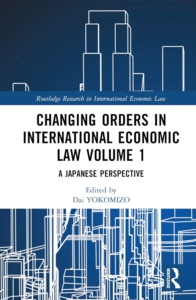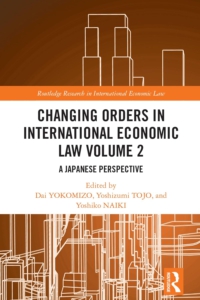Out Now: Dai YOKOMIZO, Yoshizumi TOJO, Yoshiko NAIKI (eds.), Changing Orders in International Economic Law: A Japanese Perspective, Vol. 1 and Vol. 2, Routledge, 2023.
These two volumes celebrate the 30th anniversary of the Japan Association of International Economic Law (JAIEL), which was founded in 1991. The Volumes include 30 contributions written by eminent Japanese scholars from different background, in particular, private international law, public international law, international economic law, competition law, intellectual property law etc.


The blurb of the book reads as follows:
These two groundbreaking volumes look at complex legal issues in the changing global economy from the perspective of Asia and/or Japan. Contributors scrutinize the past, present, and future and discuss what the global legal order in economic fields could be like by navigating uncertain and turbulent times.
The books address six main themes: (1) Polarization and diversification of values, progress of regionalism and restructuring of multilateral rules, (2) Full-scale arrival of the digital economy and its impact, (3) Empowerment of private persons/entities, (4) Reconsideration of the concept of “territorial jurisdiction”, (5) Law of national security and rule in emergency situations, and (6) Values of Sustainable Development Goals (SDGs) in trade and investment liberalization rules. The books also examine various legal problems under the COVID-19 crisis and suggest how the post-COVID-19 global economic order will be from the perspective of Asia and/or Japan.
This comprehensive insight will shed light on the intertwined and complex phenomena of world economy and allow readers of business law and international law to have a better understanding of this volatile era.
The two volumes are particularly interesting as they make accessible to the global community of scholars and practitioners the remarkable Japanese scholarship of international economic law. In his Preface, Prof. Takao Suami (Waseda University), pointed out three features of the two volumes’ contributions: “Firstly, all of them are characterized by their Japanese perspectives. Since all lawyers cannot avoid bringing up their understanding of law including international law in their local contexts, it is unavoidable that approaches to international economic law are not identical in different places. These articles expose such non-Western perspectives to the world. Secondly, many of them deal with newly emerging issues. Japanese scholars are sensitive to change in a global society. Therefore, they deal not only with the digitalization of the global economy but also with the impact of COVID-19 or national security on the international economic order. Thirdly, they cover subjects concerning both public and private international laws (conflict of laws). Their combination constitutes a tradition of Japanese academic approaches. Japanese scholars understand that this combination has become more important than ever under the progress of globalization.”
The table of content and the contributions’ abstracts are found here (Volume 1) and here (Volume 2).


